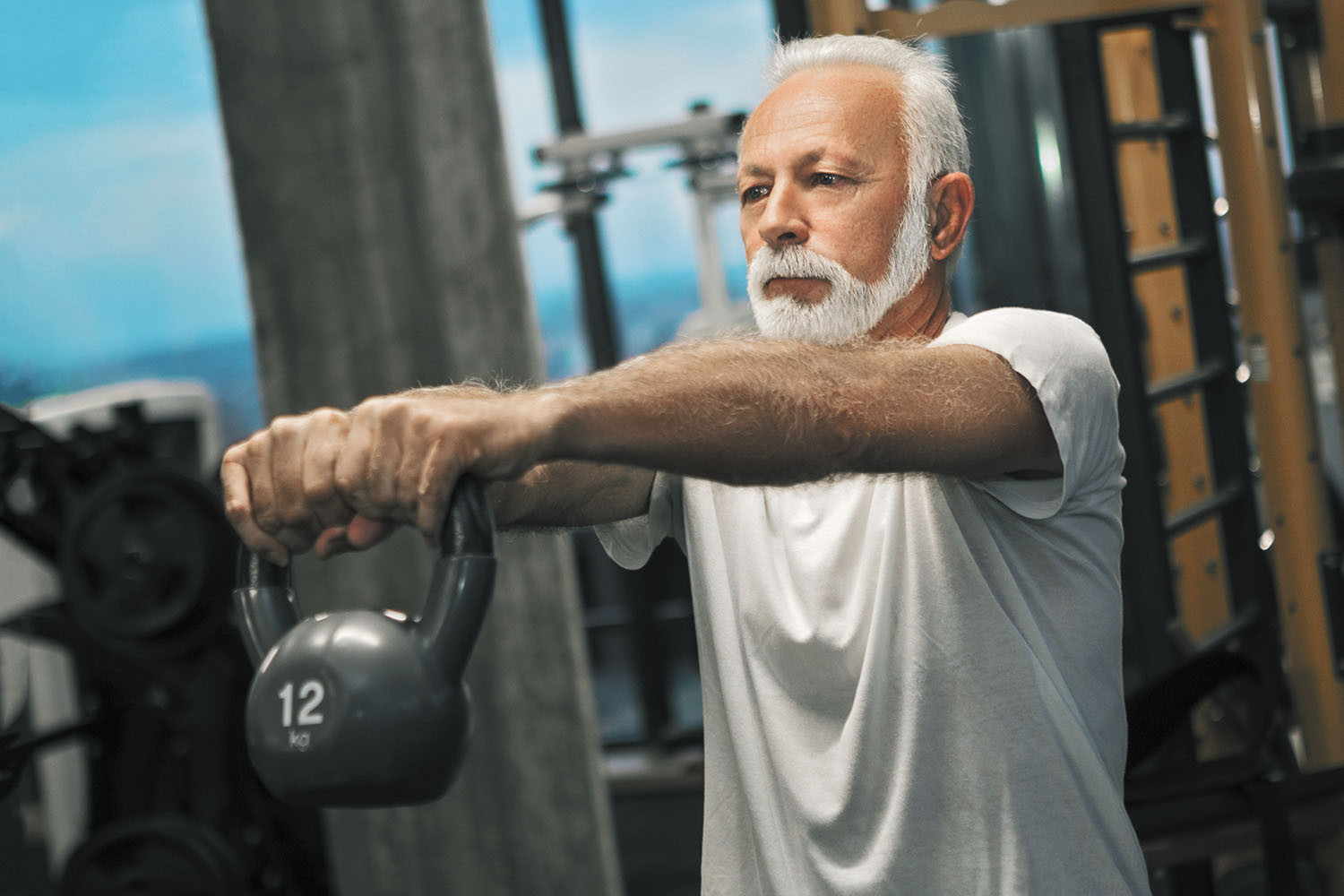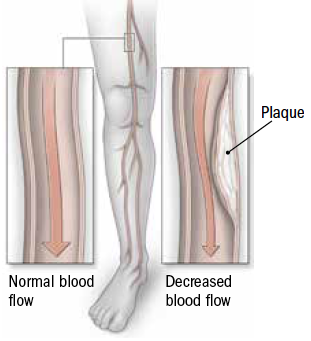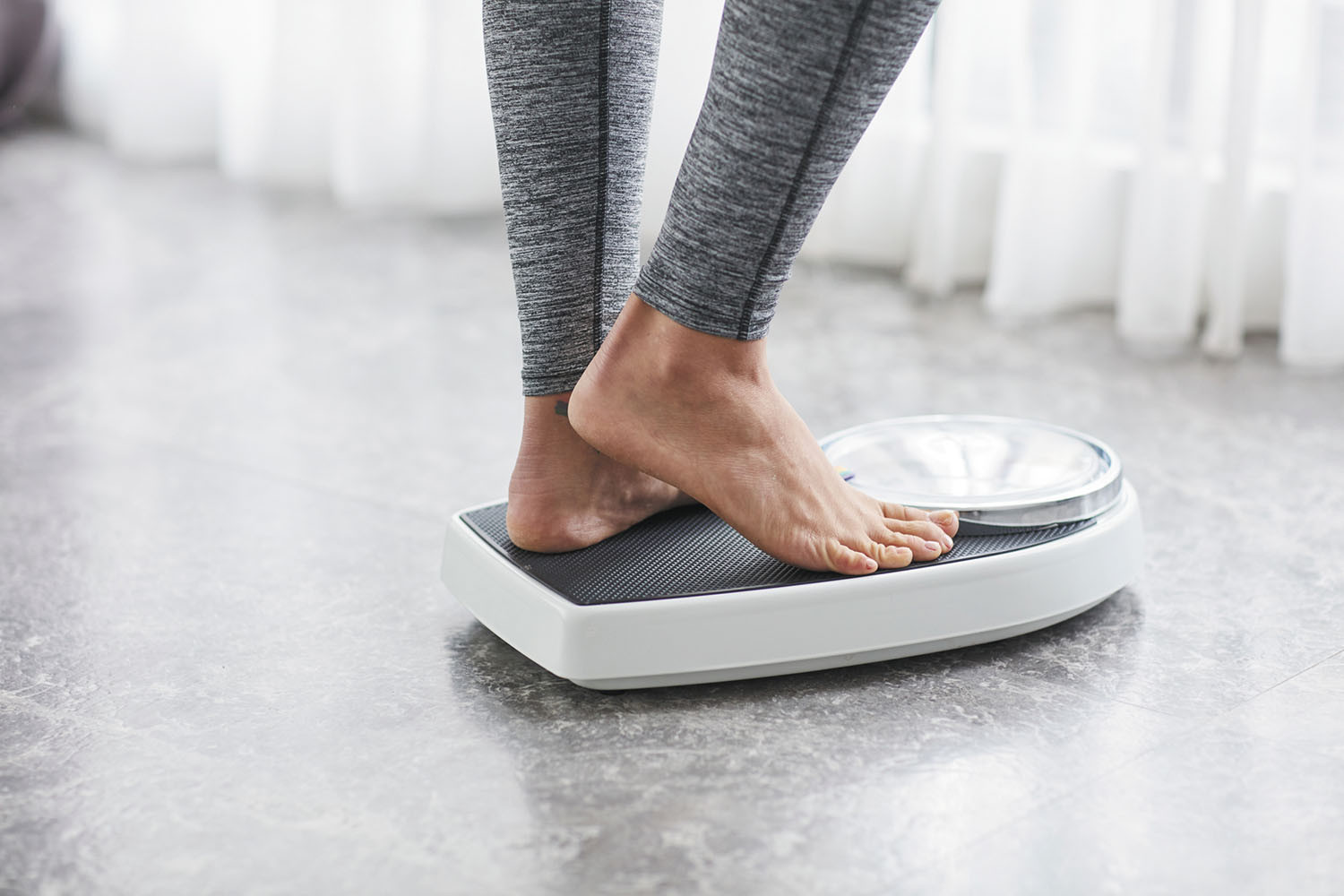
What are somatic workouts?

How to curb your stress eating

How to spot Parkinson’s disease symptoms

8 simple ways to reduce ultra-processed foods in your diet

Heart failure symptoms in women: How they’re different

GERD diet: Foods to avoid to reduce acid reflux

Strong is the new skinny

Everyday habits that sneakily weaken your bones

Don’t wait to get help for back pain

Correcting how you walk may ease osteoarthritis knee pain
Exercise & Fitness Archive
Articles
Take a swing at kettlebells
Here's why you should add kettlebells to your workouts.
Once considered trendy gym equipment, kettlebells now rank among the most versatile, go-to exercise tools.
Kettlebells look like a ball or bell with a handle on top. They vary in weight from 5 to 30 pounds or more. While they can function similarly to dumbbells, kettlebells have some distinct advantages. Unlike dumbbells, for example, kettlebells have an offset center of gravity.
A leg up on peripheral artery disease
The condition causes leg pain and fatigue that make activity difficult, but lifestyle changes can improve how you feel.
The occasional leg pain or stiffness is often not cause for concern, but if pain or fatigue develops after just a few minutes of walking or climbing stairs, it could be an early sign of peripheral artery disease (PAD).
"PAD not only interferes with an active lifestyle, but also can put you at higher risk for a heart attack and stroke," says Dr. Michael Belkin, chief of the Division of Vascular and Endovascular Surgery with Harvard-affiliated Brigham and Women's Hospital. "You can't cure PAD once it occurs, so you want to take measures to avoid it as much as possible."
Broader social interaction keeps older adults more active
In the journals
A strong social life has been linked with many health benefits, like less risk of depression and longer life span. But a new study suggests that interacting with a wide range of people may offer even greater benefits.
The study, published Feb. 20, 2019, in The Journals of Gerontology, Series B: Psychological Sciences and Social Sciences, found that older adults who interacted with people beyond their usual social circle of family and close friends were more likely to have higher levels of physical activity, greater positive moods, and fewer negative feelings.
Is lack of exercise a problem if I'm at my ideal weight?
Ask the doctors
Q. I don't need to lose weight, so I don't exercise very often, but I maintain a healthy diet. Could my lack of exercise lead to health problems?
A. Exercise is essential for good health — even if you're not overweight. This point is illustrated by a recent study, published March 1 in The American Journal of Cardiology. It found that 30% of normal-weight people who were sedentary had the same risk of heart attack and stroke as people who were overweight. In short, just being at a healthy weight didn't necessarily ensure that someone was in good health. In addition to having a higher risk of serious cardiovascular events, some inactive but normal weight people were also more likely to have labored breathing during exercise and a larger-than-recommended waist circumference, compared with normal-weight adults who exercised regularly.
Exercise after age 70
There are no official fitness guidelines for older adults, but the basic exercises for senior are the same at every age.
The average 65-year-old can expect to reach her 85th birthday, and the average 75-year-old will live to age 87. How we'll celebrate those birthdays — as the life of the party or immobilized on the sidelines — has a lot to do with how we spend our time today. Although none of us can be certain that we'll be spared debilitating disorders that could rob us of our mobility, there's no doubt that regular exercise will help improve our ability to function at almost any age or level of fitness.
8 pill-free ways to lower your blood pressure
A healthy diet that includes plenty of fresh fruit and vegetables can help to lower and control high blood pressure. Images: Thinkstock |
Try losing weight, changing your diet, and exercising.
Sometimes getting your blood pressure under control requires that you take several medications each day, such as a diuretic and a calcium-channel blocker. But some therapies don't involve medication. "People who have drug intolerances or are unwilling to take medications can try pill-free therapy, and it can also be used to make a medication regimen more effective," says Dr. Randall Zusman, a cardiologist and Harvard Medical School associate professor.
Interrupt your sitting time to ward off heart disease
News briefs
There's a silver lining in a recent study that found older women who were sedentary for long chunks of time had a much higher risk for developing cardiovascular disease than women who sat less. The observational study, published Feb. 22, 2019, in Circulation, analyzed activity patterns of more than 5,000 older women (ages 63 to 97) for a week, and then followed them for another five years. Both the total time spent sitting each day and the duration of each period of inactivity was measured with fitness trackers. The key finding: an additional hour of total sedentary time was associated with a 12% higher risk for cardiovascular disease during the follow-up period, and when that sitting time was made up of long uninterrupted sedentary sessions, the risk was far higher (as much as 54%) than when it was accumulated in short, regularly interrupted bouts of sedentary time. The silver lining: reducing sedentary time by an hour per day was linked to a 12% lower risk for cardiovascular disease and a 26% lower risk for developing heart disease during the study period. Even better: researchers say the one-hour reduction each day doesn't have to be accumulated at one time. The moments spent jumping up to get a glass of water, running out to your mailbox, or darting across the house to get the phone can all add up. The key is to interrupt your sitting time with activity that will get your heart and lungs pumping.
Image: © monkeybusinessimages/Getty ImagesPut your heart in the right place
After a serious heart-related event, cardiac rehabilitation can help you feel better and live longer.
If you have a heart attack, heart surgery, or another cardiac event, what's the best way to prevent future heart problems? Participate in cardiac rehab, a program that provides supervised exercise and teaches you the fundamentals of a heart-healthy lifestyle over a three-month period.
"The benefits of cardiac rehab are indisputable. It's more effective than any other intervention for preventing future heart-related problems and hospitalizations," says Dr. Hicham Skali, associate director of the Cardiac Rehabilitation Program at Harvard-affiliated Brigham and Women's Hospital. Eligible people who participate in cardiac rehab have a 24% lower risk of dying of cardiovascular disease compared with those who do not attend a rehab program. Cardiac rehab has also been found to improve your ability to exercise and your quality of life, he adds.
Being sedentary may be as bad for the heart as being overweight
Research we're watching
Even if you're at a healthy weight, being out of shape may increase your risk of heart disease just as much as if you were overweight, a study in the March 1 Journal of the American College of Cardiology reports.
The study included data from people ages 40 to 79 who were at a healthy weight or overweight based on their body mass index (see www.health.harvard.edu/bmi for a calculator). The participants also provided information about their exercise habits, how long they sat each day, and whether they ever felt short of breath when hurrying or walking up a slight hill.
Four keys to prevent cardiovascular disease
Are you doing everything you can to keep your heart healthy?
After decades of steady decline, the number of deaths from cardiovascular disease (CVD) has risen over the past few years, according to the American Heart Association.
The good news is that an estimated 80% of all CVD cases — heart disease, heart attack, heart failure, and stroke — can be prevented. The key is to control high blood pressure and high cholesterol and to maintain healthy habits, such as exercising regularly, eating a plant-based diet, getting enough sleep, and not smoking.

What are somatic workouts?

How to curb your stress eating

How to spot Parkinson’s disease symptoms

8 simple ways to reduce ultra-processed foods in your diet

Heart failure symptoms in women: How they’re different

GERD diet: Foods to avoid to reduce acid reflux

Strong is the new skinny

Everyday habits that sneakily weaken your bones

Don’t wait to get help for back pain

Correcting how you walk may ease osteoarthritis knee pain
Free Healthbeat Signup
Get the latest in health news delivered to your inbox!
Sign Up











